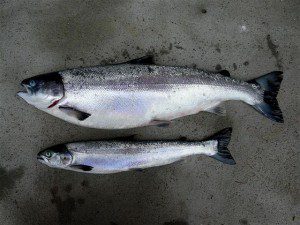

HSMI was transmitted to salmon by inoculation with tissue extracts of diseased fish or by co-habitation. RNA was extracted from the heart and subjected to high throughput sequence analysis, which revealed the presence of a novel member of the reovirus family. These are are non-enveloped, icosahedral viruses with 10-12 segments of double-stranded RNA that infect a variety of hosts, including humans: rotaviruses are important agents of gastroenteritis.
The presence of piscine reovirus in salmon with HSMI was examined by polymerase chain reaction assays. Included were heart and kidney samples from 29 salmon from three different outbreaks of HSMI, and from 10 healthy fish. All but one of the diseased fish, and none of the healthy fish, contained PRV nucleic acid. To determine the prevalence of PRV in healthy salmon, samples were collected from 9 different Norwegian coastal waters. Sixteen of 66 (24.2%) of these fish were positive for PRV.
Is heart and skeletal muscle inflammation of salmon caused by piscine reovirus? It’s possible, but further work is needed to prove causality, as the authors write:
Formal implication of PRV in HSMI will require isolation in cell culture and fulfillment of Koch’s postulates, or prevention or modification of disease through use of specific drugs or vaccines.
It’s important to identify the etiologic agent of HSMI because it is a threat to both farmed and wild salmon. Farmed fish are kept in pens in the open ocean, facilitating spread of infectious diseases to wild fish. Knowledge of the causative agent will permit preventive measures such as immunization.
Palacios G, Lovoll M, Tengs T, Hornig M, Hutchison S, Hui J, Kongtorp RT, Savji N, Bussetti AV, Solovyov A, Kristoffersen AB, Celone C, Street C, Trifonov V, Hirschberg DL, Rabadan R, Egholm M, Rimstad E, & Lipkin WI (2010). Heart and skeletal muscle inflammation of farmed salmon is associated with infection with a novel reovirus. PloS one, 5 (7) PMID: 20634888

It is clear that fish farming is a solution to the growing global demand for food, but the real challenge is how to feed the world with fish without destroying our coastal environment.
greenfingers voucher code
Farmed fish are a problem, not a solution.
How disgusting that the have to ‘vaccinate’ the damn farmed fish to keep it from getting sick?? Isn’t farming the fish gross enough?? FRIENDS DON’T LET FRIENDS EAT FARMED FISH…look us up on Facebook. No one in Alaska would be caught dead GROWING, EATING OR SELLING THAT STUFF. EEEEEWWWWW!!!
Join my group on Facebook!! Friends Don’t Let Friends Eat Farmed Fish!!
Pingback: Fish virus found in Canadian waters | Aquaculture Directory
Pingback: women hang
Pingback: massachusetts.tribe.net
Pingback: Impacts of Salmon Farming – Grassroots Rendering